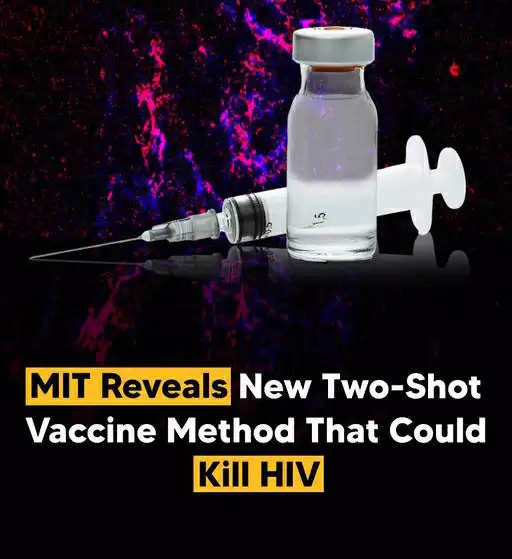MIT Researchers Discover Two-Dose Strategy for HIV Vaccine Development

Cambridge, Massachusetts – Researchers at the Massachusetts Institute of Technology (MIT) have presented a revolutionary way of vaccine administration that could expedite immunisation while preserving efficacy, marking a significant milestone in the fight against HIV. The work tackles a significant obstacle in the creation of an HIV vaccine: the virus's fast mutation and capacity to elude the immune response brought on by vaccinations. It builds on earlier results regarding antibody formation.
Given its propensity for quick mutations, HIV presents a special difficulty for those working on vaccines. Due to this feature, the virus can evade antibodies that are triggered by vaccination, which makes it more challenging to mount a durable immune response. The MIT team's earlier research suggested that giving an HIV vaccine in escalating dosages over a two-week period could boost the creation of antibodies. However, logistical issues make this approach unfeasible for general usage.
The researchers at MIT have made significant progress in their most recent trial by proving that a less complicated two-dose regimen spaced just one week apart may produce an immunological response as strong as one obtained with a more intricate seven-dose protocol. While the second dose is greater and successfully boosts the immunological response, the first dose is smaller and acts as a primer for the immune system.
Using mouse models, the researchers evaluated this novel technique with an HIV envelope protein. According to their research, giving 20% of the vaccine in the first dosage and 80% in the booster dose results in immunological responses that are similar to those brought about by more frequent dosing schedules. This discovery could drastically change the HIV vaccine landscape by increasing the process's viability for broader populations.
Clinical trials are now being conducted on a single-dose version of the vaccine, and the MIT team is hopeful that work on studies utilising the two-dose approach will soon move forward. This two-pronged strategy may be crucial to supporting larger immunisation campaigns, particularly in areas where the HIV epidemic is most severe.
The researchers are investigating different dosage schedules and creating delivery materials that may prolong the immune response from the second treatment in an effort to further improve the effectiveness of their two-dose strategy. One of the main obstacles to achieving an effective HIV vaccination is addressed by these advances, which seek to offer a more potent and long-lasting defence against the infection.

The ramifications of this research are significant as the global community continues to struggle with the complexity of HIV. In the event that the two-dose method shows promise in clinical testing, it may streamline the immunisation procedure and improve accessibility for people living in high-risk areas. This is especially important as international health organisations work to stop the spread of HIV and enhance the health of those who are infected.
Public health has long prioritised the development of an effective HIV vaccine, and the MIT team's findings represent a promising advancement in this direction. The study emphasises the need for ongoing funding for vaccine development in addition to highlighting the possibility for creative dosing schemes. The aim is that a workable HIV vaccine will soon become a reality as the scientific community builds on these discoveries, providing a new weapon in the fight against one of the most persistent and deadly viruses in modern history.
The MIT team is still dedicated to furthering their research and improving their methodology as the project moves into animal testing. One discovery at a time, the global health landscape is changing, and with it, the possibility of a more promising future in HIV prevention.
--
